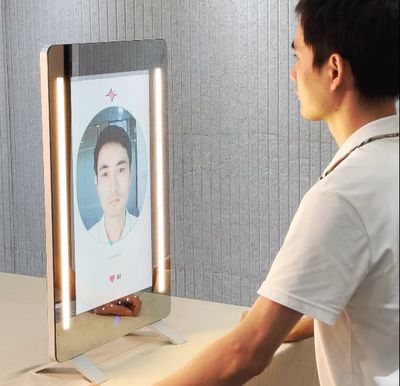CES 2024: This 'MagicMirror' Analyzes Facial Blood Flow to Monitor Vital Signs
NuraLogix this week unveiled the Anura MagicMirror, a new health product that is designed to use a combination of sensors and artificial intelligence to check vital signs and provide disease risk assessments.
The 21.5-inch tabletop smart mirror takes a 30 second scan when a person sits in front of it, analyzing facial blood flow to provide a wealth of information. It uses a patented Transdermal Optical Imaging technology to detect a person's face and monitor blood flow. Machine learning algorithms use the data to provide information on more than 100 health parameters.
NuraLogix says that the MagicMirror can provide health information that includes blood pressure, BMI, heart rate variability, pulse rate, breathing rate, and facial skin age. It can provide risk assessments for diabetes, cardiovascular disease, stroke, hypertension, fatty liver disease, and more, plus it offers assessments of mental stress and depression risk.

More information on the MagicMirror can be found on the NuraLogix website. The company has not provided a launch date or a price, but the device appears to be aimed at clinic waiting rooms, retirement homes, and other health-related facilities.
Popular Stories
The long wait for an Apple Watch Ultra 3 appears to be nearly over, and it is rumored to feature both satellite connectivity and 5G support.
Apple Watch Ultra's existing Night Mode
In his latest Power On newsletter, Bloomberg's Mark Gurman said that the Apple Watch Ultra 3 is on track to launch this year with "significant" new features, including satellite connectivity, which would let you...
Apple's next-generation iPhone 17 Pro and iPhone 17 Pro Max are just over two months away, and there are plenty of rumors about the devices.
Below, we recap key changes rumored for the iPhone 17 Pro models.
Latest Rumors
These rumors surfaced in June and July:Apple logo repositioned: Apple's logo may have a lower position on the back of the iPhone 17 Pro models, compared to previous...
The iPhone 17 Pro Max will feature the biggest ever battery in an iPhone, according to the Weibo leaker known as "Instant Digital."
In a new post, the leaker listed the battery capacities of the iPhone 11 Pro Max through to the iPhone 16 Pro Max, and added that the iPhone 17 Pro Max will feature a battery capacity of 5,000mAh:
iPhone 11 Pro Max: 3,969mAh
iPhone 12 Pro Max: 3,687mAh...
Apple's position as the dominant force in the global true wireless stereo (TWS) earbud market is expected to continue through 2025, according to Counterpoint Research.
The forecast outlines a 3% year-over-year increase in global TWS unit shipments for 2025, signaling a transition from rapid growth to a more mature phase for the category. While Apple is set to remain the leading brand by...
AppleInsider's Marko Zivkovic today shared a list of alleged identifiers for future Mac models, which should roll out over the next year or so.
The report does not reveal anything too surprising, but it does serve as further evidence that Apple is seemingly working on new models of every Mac, including the MacBook Air, MacBook Pro, iMac, Mac mini, Mac Studio, and Mac Pro.
Apple is...
The upcoming iPhone 17 Pro and iPhone 17 Pro Max are rumored to have a slightly different MagSafe magnet layout compared to existing iPhone models, and a leaked photo has offered a closer look at the supposed new design.
The leaker Majin Bu today shared a photo of alleged MagSafe magnet arrays for third-party iPhone 17 Pro cases. On existing iPhone models with MagSafe, the magnets form a...


















